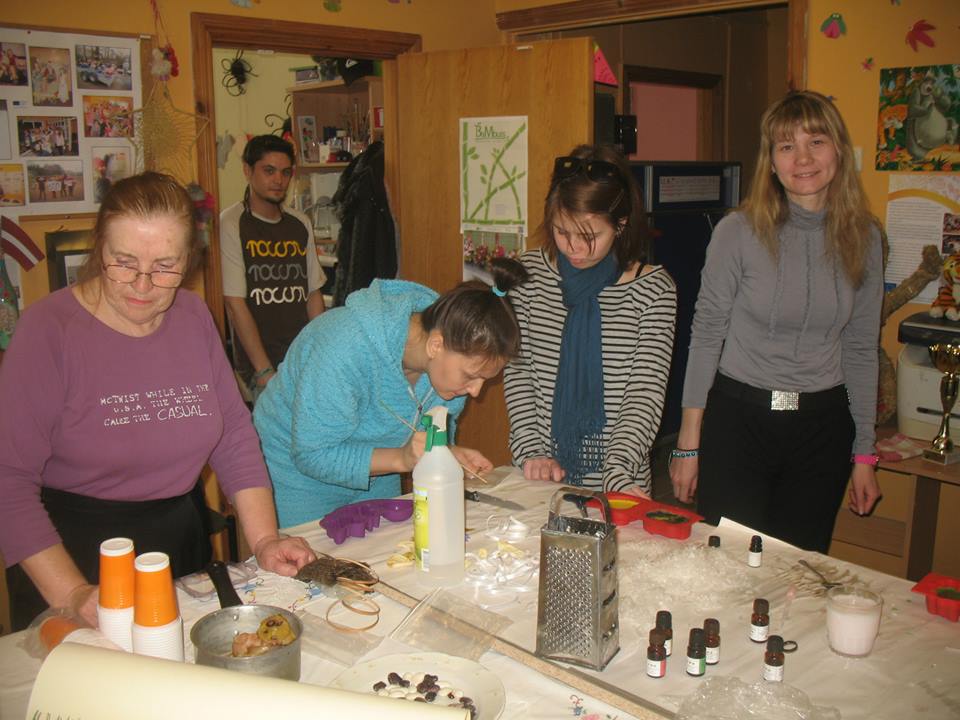More than a hundred and fifty third-country nationals are attending the Latvian language courses in six project implementation places – Riga, Olaine, Stopiņi, Liepāja, Alūksne, Balvi, there are two training groups of different proficiency level provided in every city and town. In total, there are 12 study groups.

To support the Latvian language learning activities at the local and regional level within the framework of the project, there are also integration programmes for practical use of the Latvian language provided, in which the third-country nationals involved in the project participate. There are 13 conversational clubs in the above mentioned cities and towns, 10 of them are in the regions. In Riga, the activity is offered for seniors and other vulnerable groups, as well as there is one group working with the foreign students – third-country nationals. During the classes, the participants get to know the culture, traditions, history of Latvia, its objects of cultural heritage; thereby community resources of local significance – museums, libraries, schools, culture centres – are involved, thus reducing psychological barrier to start speaking Latvian. Since the launch of the Project, the participants of Riga training course have attended the National Library of Latvia, the participants of Stopiņi Municipality training course visited Kr. Barons’ Memorial Museum, and the third-country nationals of Alūkne were involved in weaving Alūksne town anniversary belt.

There are also Integration classes offered to people of different age and nationalities within the framework of the project. In total, 58 integration classes – support activities – have been already organized, 30 of which were held in the regions, 28 classes were held in Riga for a specific target group – seniors and other vulnerable groups. There are approximately 80 third-country nationals involved in the Integration Programmes. The following activities are carried out within the framework of the Integration classes: creative activities of the programme “Diversity of the Latvian Cuisine” (Riga); creative activities – workshops of the programme “Stained Glass of My Life” (Riga); the programme of the socio-psychological support club "One for Another" (Riga); the programme of creative activities "Latvian Crafts" (Riga); integration activities in Stopiņi, Alūksne, and Balvi.

To provide support for the project target audience, volunteers of the association are also involved in the activities – both Latvians and third-country nationals; several motivation increasing seminars to raise awareness of volunteering have been held within the framework of the project.

To improve the availability of information on the services and rights available to third-country nationals in Latvia, individual help is provided to people before or after their entering into Latvia, offering specialist advice by telephone and e-mail, as well as meeting them personally. In four months, 40 third-country nationals used expert services, in total 77 consultations were provided. Lawyer G. Miruskina (G. Miruškina) points out that people were mostly interested in such topics as family reunion, employment, and inheritance issues.
With a purpose to reflect problem solutions topical for the third-country nationals and to provide an opportunity for the project target group to get acquainted with the information both before entering Latvia and when they are already in Latvia, special story cycle “Find out where to find out” is offered within the framework of the project. Similarly, access to the information about the services and the rights available to the target group is provided on the website www.dzivotlatvija.lv, as well as during the NVOTV round-table discussions on integration.
To promote active formation of immigrant social organizations, a mentor programme for facilitating participation has been prepared within the framework of the project involving mentors – third-country nationals. The aim of the said programme is to involve third-country nationals, recently naturalized Latvian citizens from immigrant families, as well as non-citizens to participate in civic activities, to create initiative groups and associations for identification and representation of the immigrant interests. It is planned that mentor pilot projects will be launched in the near future.
NGO capacity and collaboration issues are addressed during the project by the help of the Dialogue Platform. Two meetings have already been organized within the framework of the project where NGOs that are active in the field of immigrant integration shared current events of the field and the needs of third-country nationals, as well as discussed the most important policy tools – planning of the activities of the EU Asylum and Migration Fund in Latvia, legislation and policies influencing the integration of immigrants.
*Third-country nationals are all persons other than citizens of EU, EEA states or Swiss Confederation.
The project is co-financed by the European Union. Implementation of the project "Diverse Solutions for Public Education and Integration 3" is co-financed by the European Fund for the Integration of Third-Country Nationals (75%) and state budget (25%). This publication is supported by the European Fund for the Integration of Third-Country Nationals. Responsibility for the content of this publication lies with the society “Shelter “Safe House””.
Additional information:
Rasa Saliņa, communication and social media expert
Cell phone number: (+371) 22026355
rasa.salina@gmail.com


